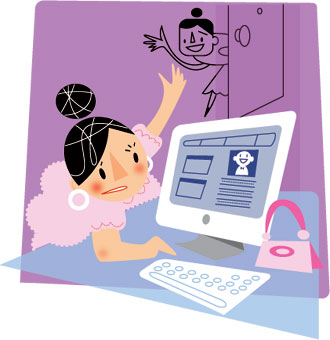 Dumping Facebook
Dumping Facebook
I knew I had a problem with facebook when I spent three hours sitting in the middle of a computer lab, poring through other people's photo albums. Everyone has a breaking point, and this was mine. I informed facebook that I was ending our relationship.
A dialogue box popped up. "Are you sure you want to leave facebook?" it asked. I cringed, then clicked "Yes."
Facebook and I had spent the better part of the past year and a half together, and I knew I'd miss its wit, its love of gossip, and its enthusiastic availability. My ex was a very popular piece of social networking software, meaning I would have to endure my friends' discussions of its attractive features and the knowledge that my negative experience would not alter anyone else's involvement with it.
At Kenyon alone, facebook's charms had claimed more than 700 students. Like me, they were willing subjects in facebook's world of acquiescent voyeurism. With facebook, I could read other college students' self-designed profiles, browse and subsequently scrutinize their lists of "friends," peruse their photo albums. Without it, I was on my own in this community of sixteen hundred overintellectual and undersexed students, all squeezed into a tiny village. And, quite frankly, facebook, for all its flaws, entertained, comforted, and maintained contact with me far more consistently than any of my human exes ever did.
When I was introduced to facebook at the beginning of my sophomore year, I was naturally attracted by its ability to provide detailed, guilt-free gossip at my convenience. This was a step above the surveillance and eavesdropping that I did in the dining halls, dorms, and Delt lounge. It answered questions that it's awkward to ask someone after you've spent months giving them the acquaintance-nod on Middle Path, such as major, class year, and, you know, last name. It told me that a wooable male was available, interested in women, and potentially promiscuous (he was "looking for" "whatever I can get"). It even gave me a list of Kenyonites who would be studying in Europe at the same time I was.
And then there was the allure of deception. Facebook feigns transparency, but it is actually unreliable, over-clever, and tongue-in-cheek. Students' profiles are laden with irony and self-aware self-obfuscation. Facebook tells me that an egregiously "hip" member of the class of '08 has 800 favorite bands and that one of my friends is married to Michel Foucault, the dead French philosopher. Of course, I'm implicated as well. Facebook snidely reminds me that, according to my own profile, I am facebook-engaged to my friend Anne Marie, although the only romantic experiences I've had at Kenyon have been heterosexual situations best categorized under facebook's "it's complicated" option.
Actually, when I realized that facebook was self-involved, paralyzed by its options, and seemingly incapable of meaningful communication, I was thrilled. This was the spitting image of my "complicated" romantic interest, a non-virtual Kenyon man. Moreover, when my semester-abroad stint in Ireland further complicated this real relationship, facebook became all the more important. As the man-o-flesh wavered in his attentions, my supplementary relationship with facebook blossomed.
In Ireland, I started logging on at least four times a day, sometimes for one-hour sessions. I knew I was spending too much time with facebook, but I couldn't stop. Sure, it was a little obsessive, but I was lonely, and when I looked through seventy pictures from a party my facebook-friends had thrown back at Kenyon, I felt connected to their social world. Facebook provided comfort and stimulation, two Cosmo musts.
I was in deep. By the time I returned to the States, I was beyond questioning my commitment to facebook, though it now demanded a minimum of two hours of "quality time" each day and was obviously becoming jealous of my schoolwork. I should have seen the red flags when I started getting annoyed at other people for interrupting us by actually talking to me. And then one night I spent an hour looking at pictures of a party that I'd been invited to--a party I had missed because of facebooking.
So I told facebook that I "needed my space." Yes, I clicked, I wanted out. Facebook pulled the sensitive card, assuring me that it would miss me and telling me how easy it would be to come back.
I did relapse a few times. But I managed to pull away, avoiding facebook for the better part of three months. We're friends now, or at least close enough to be facebook-friends. And I still give it the ole acquaintance-nod when I have Internet access and some extra time between classes.
--Lauren Ostberg is an English major from Maumee, Ohio.
Do you have feedback on this page?
